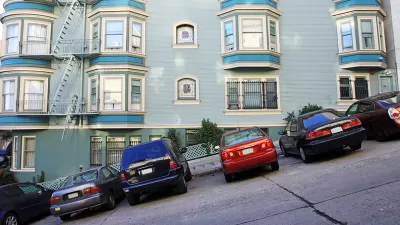The search for an available parking space in most busy downtowns can be frustrating, especially when the motorist insists on parking for free. For those cities that do charge for parking, can a variable price free-up spaces? SF hopes to prove so.
Two NYT reporters, Michael Cooper and Jo Craven McGinty provide a timely update on SF Park - a federally subsidized program that utilizes embedded sensors in on-street parking spaces to detect when a vacancy occurs and varies meter prices based on time of day and location. One main objective of the plan is to utilize pricing (often referred to as dynamic or performance pricing) and technology to reduce traffic congestion caused by motorists searching for available on-street parking.
"The program here is being closely watched by cities around the country. With the help of a federal grant, San Francisco installed parking sensors and new meters at roughly a quarter of its 26,800 metered spots to track when and where cars are parked. It is too early to tell whether the program is working over all, but an analysis of city parking data by The New York Times found signs that the new rates are having the desired effect in some areas."
However, the reporters also found that "about a fifth of the time" parking availability did not always correspond with prices, i.e. sometimes parking availability would increase with decreased prices and would decrease when prices were lowered.
"The program is the biggest test yet of the theories of Donald Shoup, a professor of urban planning at the University of California, Los Angeles. "I think the basic idea is that we will see a lot of benefits if we get the price of curbside parking right, which is the lowest price a city can charge and still have one or two vacant spaces available on every block," he said.
Thanks to Mayer Horn
FULL STORY: A Meter So Expensive, It Creates Parking Spots

Maui's Vacation Rental Debate Turns Ugly
Verbal attacks, misinformation campaigns and fistfights plague a high-stakes debate to convert thousands of vacation rentals into long-term housing.

Planetizen Federal Action Tracker
A weekly monitor of how Trump’s orders and actions are impacting planners and planning in America.

In Urban Planning, AI Prompting Could be the New Design Thinking
Creativity has long been key to great urban design. What if we see AI as our new creative partner?

San Francisco Mayor Backtracks on Homelessness Goal
Mayor Dan Lurie ran on a promise to build 1,500 additional shelter beds in the city, complete with supportive services. Now, his office says they are “shifting strategy” to focus on prevention and mental health treatment.

How Trump's HUD Budget Proposal Would Harm Homelessness Response
Experts say the change to the HUD budget would make it more difficult to identify people who are homeless and connect them with services, and to prevent homelessness.

The Vast Potential of the Right-of-Way
One writer argues that the space between two building faces is the most important element of the built environment.
Urban Design for Planners 1: Software Tools
This six-course series explores essential urban design concepts using open source software and equips planners with the tools they need to participate fully in the urban design process.
Planning for Universal Design
Learn the tools for implementing Universal Design in planning regulations.
Gallatin County Department of Planning & Community Development
Heyer Gruel & Associates PA
JM Goldson LLC
Mpact (founded as Rail~Volution)
City of Camden Redevelopment Agency
City of Astoria
Jefferson Parish Government
Camden Redevelopment Agency
City of Claremont



























